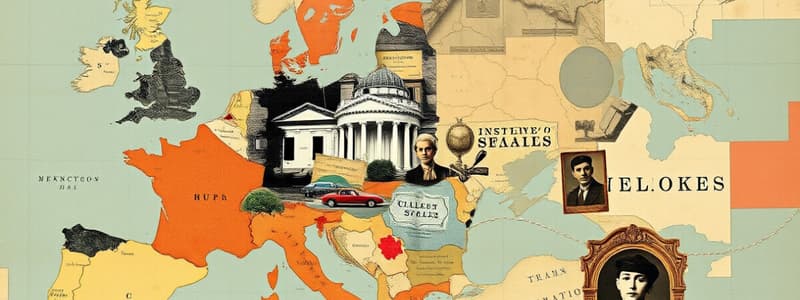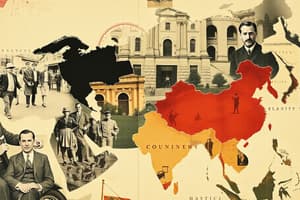Podcast
Questions and Answers
What is the condition called when there is roughly equal strength between opposing countries or alliances of countries?
What is the condition called when there is roughly equal strength between opposing countries or alliances of countries?
- Balance of Power (correct)
- Colonialism
- Imperialism
- Berlin Conference
What was the Berlin Conference?
What was the Berlin Conference?
A meeting from 1884-1885 where European nations agreed on rules for colonization of Africa.
A ______ is an invisible line that marks the extent of a state's territory.
A ______ is an invisible line that marks the extent of a state's territory.
boundary
What is defined as the city that is the seat of government of a state, nation, or province?
What is defined as the city that is the seat of government of a state, nation, or province?
What is a City-State?
What is a City-State?
What are Civil Divisions?
What are Civil Divisions?
What is Colonialism?
What is Colonialism?
Define Colony.
Define Colony.
What is a Compact State?
What is a Compact State?
What does Core refer to?
What does Core refer to?
What is Democratization?
What is Democratization?
Define Devolution.
Define Devolution.
What is an Elongated State?
What is an Elongated State?
What does EEZ stand for?
What does EEZ stand for?
Define a Fragmented State.
Define a Fragmented State.
What is a Federal State?
What is a Federal State?
What is a Frontier?
What is a Frontier?
Define High Seas.
Define High Seas.
What is Gerrymandering?
What is Gerrymandering?
What does Imperialism refer to?
What does Imperialism refer to?
What is Irredentism?
What is Irredentism?
Define a Landlocked State.
Define a Landlocked State.
What is a Microstate?
What is a Microstate?
What does a Multinational State contain?
What does a Multinational State contain?
Define a Perforated State.
Define a Perforated State.
What is a Prorupted State?
What is a Prorupted State?
What is Sovereignty?
What is Sovereignty?
Define a State.
Define a State.
What is a Stateless Nation?
What is a Stateless Nation?
What are Territorial Waters?
What are Territorial Waters?
Define Territoriality.
Define Territoriality.
What is Terrorism?
What is Terrorism?
Define a Unitary State.
Define a Unitary State.
Flashcards are hidden until you start studying
Study Notes
Political Geography Concepts
- Balance of Power: Achieved when opposing countries or alliances have roughly equal strength, impacting international relations and conflicts.
- Berlin Conference (1884-1885): A pivotal meeting where European nations established rules for the colonization and division of Africa, leading to significant geopolitical changes.
- Boundary: An invisible line that delineates the limits of a state's territory, essential for defining political and legal jurisdictions.
- Capital: The principal city where a state's government is based, often the center of political power and administration.
State Types and Structures
- City-State: An independent sovereign entity that consists of a single city and its surrounding territory, often having its own governance and policies.
- Compact State: Characterized by a relatively uniform shape where the distance from the center to any boundary remains consistent, enhancing administrative efficiency.
- Elongated State: A state with a long and narrow geographic profile, potentially complicating governance and resource distribution.
- Fragmented State: A state composed of multiple separate pieces of territory, which can present challenges for unity and governance.
- Landlocked State: Lacks direct access to oceanic coastlines, often facing economic disadvantages in trade.
- Microstate: An extremely small sovereign state that occupies a limited land area.
- Multinational State: A state that hosts multiple ethnic groups with independent traditions that coexist peacefully under a single governance structure.
- Perforated State: A state that completely surrounds another state, creating unique diplomatic and social dynamics.
- Prorupted State: Typically a compact state with a significant extension or protrusion, which can be strategically beneficial or problematic.
Governance and Authority
- Civil Divisions: Governmental branches that manage non-criminal issues, emphasizing the administrative aspects of governance.
- Federal State: A system where the central government distributes authority to local government units, allowing for regional autonomy.
- Unitary State: Centralized governance where the majority of political power is concentrated in the national government, minimizing the power of local entities.
- Sovereignty: The supreme authority of a state to govern itself without external interference, critical for national autonomy.
- Democratization: The process of increasing the prevalence of representative government across different nations, promoting political inclusivity.
International Law and Territorial Issues
- Exclusive Economic Zone (EEZ): A maritime area extending up to 200 nautical miles from a state's coast, granting special marine resource rights.
- High Seas: Portions of oceans that are not owned or controlled by any state, considered common international territory.
- Territorial Waters: Maritime zones adjacent to a country's shoreline under its jurisdiction, crucial for control and resource management.
- Territoriality: Behavioral patterns observed in animals, where individuals defend their defined space against intruders, analogous to human territorial claims.
Socio-Political Dynamics
- Colonialism: The process by which one nation establishes control over another, imposing its culture and governance on the indigenous populace.
- Imperialism: Involves the dominance of a nation over territories already inhabited, often disrupting local societies.
- Gerrymandering: The strategic manipulation of electoral district boundaries to benefit a specific political party or group.
- Irredentism: The ambition of a nation to expand its territory to include areas inhabited by its nationals in neighboring regions.
- Stateless Nation: Groups, such as Palestinians, Kurds, and Basques, that identify as distinct national entities but lack an internationally recognized sovereign territory.
Security and Conflict
- Terrorism: The use of violence by non-state actors against civilians, intended to instill fear and compel governmental policy changes.
- Frontier: A region separating two political entities where neither exercises full authority, often leading to tensions or unique interactions.
Studying That Suits You
Use AI to generate personalized quizzes and flashcards to suit your learning preferences.




